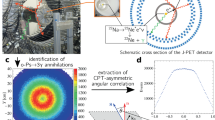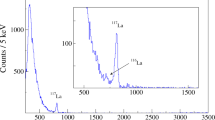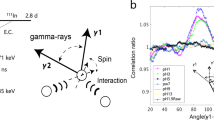Abstract
ACCORDING to Fermi's theory1 for the emission of -particles, and its modification by Konopinski and Uhlenbeck2, a nucleus can, instead of emitting a positron, absorb an electron from the K-shell, thus giving rise to the emission of the K-irradiation from the element formed by the transformation. The ratio of the probabilities F for the emission of a positron and FK for the absorption of a K-electron has been calculated by Møller3 and by Mercier4; for scandium (Z = 21), the value for FK/F varies from 0.1 to 5 according to the assumptions made in the theory.
This is a preview of subscription content, access via your institution
Access options
Subscribe to this journal
Receive 51 print issues and online access
$199.00 per year
only $3.90 per issue
Buy this article
- Purchase on Springer Link
- Instant access to full article PDF
Prices may be subject to local taxes which are calculated during checkout
Similar content being viewed by others
References
Fermi, Z. Phys., 88, 161 (1934).
Konopinski and Uhlenbeck, Phys. Rev., 48, 7 (1935).
Møller, Phys. Rev., 51, 84 (1937).
Mercier, C.R. Acad. Sci., 207, 1117 (1937).
Williams and Nuttall, Phil. Mag., 2, 1109 (1926).
Author information
Authors and Affiliations
Rights and permissions
About this article
Cite this article
JACOBSEN, J. Positrons from Radio-Scandium. Nature 139, 879–880 (1937). https://doi.org/10.1038/139879a0
Issue Date:
DOI: https://doi.org/10.1038/139879a0
This article is cited by
-
Nuclear Transformation by K-Electron Capture
Nature (1938)
-
Capture of Orbital Electrons
Nature (1937)
Comments
By submitting a comment you agree to abide by our Terms and Community Guidelines. If you find something abusive or that does not comply with our terms or guidelines please flag it as inappropriate.



